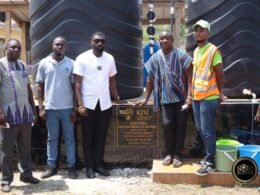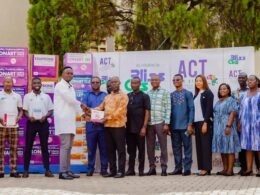Photographing for Social Change: The Power of Photography.
I am optimistic about the future of photography in this visually oversaturated world. That’s
because I believe in its transformational power. It’s a universal language we all speak, and
great photos communicate so much, in an instant, without words or sound. Growing up as a young boy in a deprived community as a result of social challenges, I developed a drive to be a voice for change for the people and the environment around me.
I would spend my entire time after school helping my mother who sells live poultry at the Adum Railways market in Kumasi and whenever I visited my mother at the market, I would see young girls sitting in large groups either chatting or sleeping or playing.

Been at the market you will mostly hear people shouting and calling “Kayayo” and these girls would quickly jump, take their silver pans and rush to where the call came from, the next thing you will see is one or two girls carrying heavy loads twice their weights for patrons who are not circumspect and don’t think twice having them carrying those heavy loads. This has been a very sensitive topic for me for the past 10 to 12 years.

WHO ARE THE KAYAYO GIRLS?
They are young women, sometimes girls, coming from northern Ghana’s remote area who travel south to find work as porters in cities like Accra and Kumasi. They go by the name of Kayayo, the Kayayei in the plural. When you look at them you will certainly be shocked but surely you could never imagine their story or the roles that they play in this market. If only the stuff they carry on their head could talk.

WHAT DOES KAYAYO MEAN?
The word Kayayo comes from the GA local language meaning “girl-carrier”. “Kaya” means ‘load, luggage, good or burden” in the Hausa language, and “yei” means “women or female”.
They travel from their villages to work in bustling cities like Accra or Kumasi, in search of a “better” life. This choice of lifestyle is often considered a last resort in a desperate situation, many of them see it as an opportunity to free themselves from the confines of village life and be able to make their own money and feel a little more independent. Village life means taking care of their family and not having access to education.
SOCIO-ECONOMIC AND MIGRATION OF DYNAMICS OF KAYAYO.
Every year, thousands of women and young girls migrate from Ghana’s north to the major cities of the south. Known as Kayayo, they travel to work as porters in city markets and spend their days carrying heavy loads for meager wages. Due to a shortage of employment opportunities and money for housing, many end up sleeping on the streets or being coerced into sexual servitude in exchange for shelter.

They make the journey to escape a region where meager subsistence farming is the primary occupation; where it is a normal practice for girls to do housework and raise their male siblings rather than attend school; and where education, infrastructure, and health care lag behind the rest of the country.

While some are forced by their families to go and help increase the household’s earnings, others travel willingly, hoping to escape arranged early marriages or the north’s severe lack of employment. Many work seasonally, returning home annually to help harvest on family farms, and many, drawn to an appearance of becoming more modern, stay on in the cities and attempt to carve out a new existence. Their reasons for making the journey vary, but the root cause is the same: They are at the center of a cycle of poverty, and early child marriages, from a region known for poor education and infrastructure and infertile land, and they are trying to escape. When they are asked about what they would become in the future, some are eager to go to school and become fashion designers, doctors, pilots, teachers, etc., yet their fates are shuttered by their circumstances.

In the south, they perform backbreaking labor for almost no money and sleep 10 or 35 to a room in cramped slums on bare floors or in front of closed stores at night. Still, the girls often prefer their lives in Accra and Kumasi, and other major cities in Ghana. Some use the little money they make to continue their education. Others are simply glad to be away from their parents and have ownership over their money and possessions for the first time in their lives. While the Kayayo lifestyle is often considered a last resort in a desperate situation, many of them see it as an opportunity to free themselves from the confines of village life without the consent of their families. Some flee from early marriage and other social challenges, others also come to raise money to take care of their families back home. These girls are often between the ages of 6 years to 25 years and most of them are dropouts or have never been to school. Most of them do not know their age when asked because some have never stepped foot in a classroom.
WHAT ARE THE DANGERS TO KAYAYO GIRLS?
The struggle and challenges these young girls go through in their journeys are so heartbreaking.
Based on personal research and staying with some of the girls for a couple of days, I witnessed the struggle and challenges these young girls go through in their journeys and it is so disturbing. The oldest among them was 18 years of age and some become victims of all forms of sexual and gender-based violence including defilement, rape, and battery, especially because most of them cohabit with partners, etc. And the majority of these girls end up being teenage mothers due to rape and other sexual violence or activities.

According to the Kayayo Coordinator, Inusah, who is also the organizer of the Kayayo Association in Kumasi, it has been indicated that most of these pregnant teens when they find out they are pregnant abort them with the help of unprofessional local medical practitioners and the guys responsible deny them and when after given birth they lack the facilities and support or education a mother needs. It has also been indicated that 60% of these girls do not even know their Date of Birth or ages due lack of education from their communities of origin. Some of the Kayayo girls are also victims of HIV/AIDS and other sexually transmitted diseases due to unprotected sexual intercourse. Kayayo mothers have to carry their children on their backs throughout their daily jobs because there is no caretaker for them.
In other to secure accommodation, they have to pay 6 Ghana Cedis -10 Ghana Cedis (Gh₵) equivalent to USD 1.60 from their weekly earnings to sleep in a shelter with no beds or mats with about 15 -30 girls in clump rooms guided by keepers either men or women. This payment is done every week to maintain accommodation. Those who can’t afford to pay for the rooms, stay up the night wandering through the city till daybreak.
Many Kayayei faces a situation of poverty and hardship as head porters in the markets. They buy hot water every day for bathing from locals who boil them in big pots in the community for 2 Ghana Cedis (Gh₵) and those who can’t afford just have to sleep without bathing and head out the next day to work. To survive all these, they work long hours carrying heavy loads in the sun. Because Kayayei has no job security and no written contracts, they are forced to negotiate the fee for every job, which makes them vulnerable to conflicts and abuse, and exploitation.

ADDRESSING THE KAYAYO SITUATION
There is a need to address or highlight the Cultural and Socio-Economic Challenges of Female Head Porters “Kayayei” while Enforcing Women’s Empowerment and Girl’s Rights in Ghana. Kayayei girls or women are extremely vulnerable to exploitation and abuse. They suffer from a lack of access to safe medications, housing, sanitation, and cooking facilities. They are also intensely susceptible to theft, gender-based violence, and all forms of assault. According to UNFPA, it is believed that the Kayayei can play an important role in economic and social development in their communities. Given the right support, they can act as role models and game changers, advocating for: the rights of girls and women, the need to eliminate child marriage and harmful practices, Gender- Based Violence, and Reproductive health issues. With over 100,000 Kayayei nationwide, increased support is needed to ensure these young women are empowered and equipped to overcome their current challenges and contribute to their communities and country.








